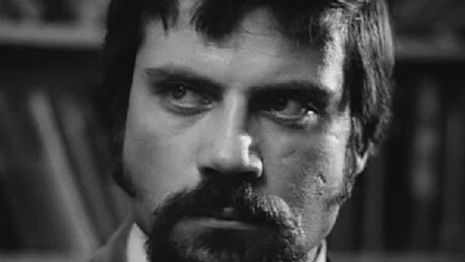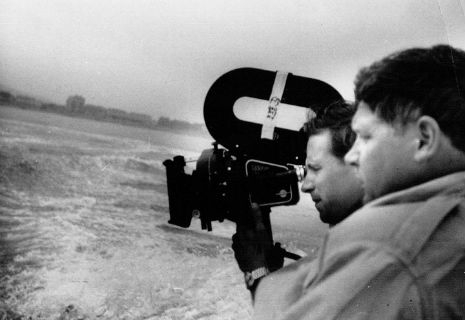
Ken Russell had thought about making a film on Debussy for some time. He was ‘hovering on the feature film fringe,’ having just made his first movie French Dressing, in 1964. But it had sadly flopped and he had returned to work as a producer and director for the BBC’s arts series Monitor.
Making a feature film had encouraged Russell’s ambitions, and he now had a revolutionary idea for a new kind of documentary arts film, but he wasn’t quite sure how best to achieve it. This was when Russell met Melvyn Bragg, a young Northern writer, who was also working in the Monitor office.
At twenty, Bragg had decided to become a writer, but thought ‘quite rightly as it turned out,’ that he wouldn’t be able to make a living from it. So, he got a job, to support his literary ambitions.
‘I got a BBC traineeship when I was twenty-one,’ Bragg told me in 1984. ‘Went into radio, which I liked an awful lot. Worked in Newcastle. Worked in the World Service, Bush House. Then I worked in Broadcasting House, in the Features Department. I was going to stay there—I didn’t like television, except for Monitor—and I said I’d only go into television if I could get an attachment onto Monitor. Eventually, one came up, and I got it.’
Russell wanted to share his idea with Bragg. He met him in a cafe, and told Bragg about Debussy and his plan for a new kind of arts documentary—a film-within-a-film. Together they wrote a script, and Bragg turned it into a screenplay.
‘When I did Debussy, Ken’s first talkie on television, nobody had done that before I did that as a screenplay as a way to make it work. The real problem you’ve got with biopics about people is that there is no structured drama in anybody’s life. You’ve got to make it.
‘What you’ve got are pits, which are very good, all over the fucking shop, and you’ve got to have that bit because [they’re] terrific, and you’ve got to have that bit because there’s hardly any relationship between them. Where, if you write a play, or write a book, there is a relationship because you’ve written it like that. But in people’s lives, something happens there, and 7 years later, something else happens. This enables us to dip in-and-out.’
It was a lunchtime in May, and I was interviewing Bragg in his office, at London Weekend Television, where he worked as editor and presenter of the (now legendary) arts series, The South Bank Show. Bragg sat behind his desk, dressed as usual in a suit (‘Another way to get people to forget about me and concentrate on the person that I am talking to’), eating an apple for his lunch.
Bragg said he thought Russell ‘a very brilliant, eccentric and erratic talent, he can be marvelous.’
The Debussy Film was the first of several highly successful collaborations between Russell and Bragg—as director and writer. A partnership that lasted until The Music Lovers (‘I had a big row with [Ken] on that which is fairly public. I hated it.’) The pair later worked together again on several documentaries for The South Bank Show .
It was also Russell’s first collaboration with actor Oliver Reed, who later described the director as:
Jesus is not Christ, only Russell.
Reed was a rare talent, who had been slightly over-looked by film producers because of a scar on his face, which he had received on a drunken night out. But Reed was more than just a feared Hell-raiser, he was a brilliant actor who brought an incredibly complex and emotional depth to the role of Debussy.
‘Debussy was an ambiguous character,’ Russell told one of his biographers, John Baxter in 1973.
...and I always let the character of the person or his work dictate the way a film goes. Also, one was a bit critical of artists like Debussy and I thought the time had come to ask questions, and the natural way for me to ask questions was to have a film director [Vladek Sheybal] talking to an actor [Oliver Reed], because an actor always asks questions about the character he’s playing and the director usually had to answer them, or try to, often to keep him happy. And when I found Debussy was friendly with an intellectual named Pierre Louys from whom he derived a lot, it seemed an analogous relationship to that of a film director and an actor. There are some points in the film, I think, where it doesn’t matter if it’s the director talking to the actor or Louys talking to Debussy—passages of intentional ambiguity.
Born in his music and his life, Debussy was a great sensualist. There’s a line of his in the film: “Music should express things that can’t be said,” which simply means to me that music is something which, the moment you talk about it, disintegrates and becomes meaningless. That’s what I mean by sensuality—something that’s felt rather than reasoned.

Ken Russell directing ‘The Debussy Film’ (1965)
While The Debussy Film may at first appear a film that is “felt rather than reasoned,” it has to be understood that every element of it is based on fact, taken from letters and personal details of the main characters. Also, by presenting inter-linking narratives, Russell was able to question, examine and comment on Debussy’s creative life, and the damage it caused him to those he loved.
With Debussy I felt it was important to say something about his music and attitudes to it as well as relevant facts of his life. A good example of this is his relationship with his mistress Gaby, and her inability to understand either him or his art. There’s a scene where the actor playing Debussy goes to a party with his girlfriend (playing Gaby) and puts on a record of Danse Sacre et Danse Profane. He wants to listen to it, to be immersed completely; he sees in it images of art nouveau. But everyone else in the room, instead of carrying on talking, or dancing to it, or giving it half an ear, all become silent and listen to the music with a mixture of duty and piety, which is all too often the case. His girlfriend, who just sees him as being perverse, does a strip-tease to it and ridicules both the man and his music. People are very wary of the heightening of experience, and want to knock it down. It’s fear as much as anything that makes her do the strip dance, fear of something she doesn’t understand and so can only get level with by ridiculing. A lot of people still do that, not just with art but with life.
I wasn’t totally on Debussy’s side; in a sense he had no right to disrupt the party. But artists are dogmatic and pig-headed, and they over-ride people. Most of the people I’ve dealt with in films have quite dispassionately sacrificed someone in their way who understood them. It’s not nice but that’s how it works. The end of the film, the music from his unfinished opera The Fall of the House of Usher, with Debussy alone in the castle and his ghostly mistress—whom he drove to attempted suicide—rising up, was an analogy of the lost romantic ideal he had destroyed by his disregard for people. You can be an egomaniac up to a point but in the end it can destroy you, or your work, or both.
The Debussy Film is Russell developing the style and technique that would make him internationally recognized as one of the greatest directors of the twentieth century. His approach was revolutionary and brilliant, and The Debussy Film changed television and cinematic biography for good. It also revealed another side to Oliver Reed (who is quite brilliant) and Vladek Sheybal, who was usually typecast as KGB agents. The film also contains cameos form artists Duggie Fields and Pauline Boty.





